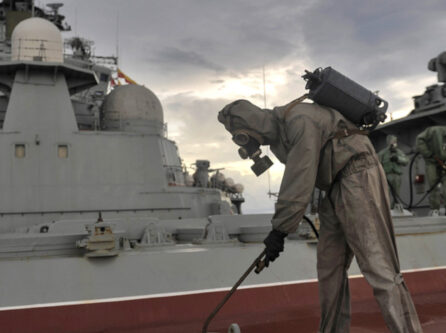Case File
Fraudulent Contracts for Peter the Great Cruiser Overhaul

Contents
Introduction
Introduction
contentsAs Russia seeks to rearm and modernize its military, one of the biggest obstacles it faces is the endemic corruption throughout the military-industrial system, including the Ministry of Defense, the armed forces, and the arms industry.
With relatively weak institutions and kleptocratic plunder enshrined as the governing system from the top down, corruption in the defense sector goes well beyond the payment of bribes to win procurement contracts. Outright embezzlement of public funds is common, and relies on the use of fake contracts. One of the most remarkable cases, though far from the largest, is that of the repair contract for the Pyotr Veliky (“Peter the Great”) guided missile cruiser.
Case Details
Case details
contentsActors
Actors
contentsFedor Barashko – director of Zvezdochka. Convicted of embezzlement and tax evasion, fined and sentenced to eight and a half years imprisonment.
Sergei Fridinskiy – Chief Military Prosecutor.
Konstantin Khriukin – Barashko’s successor as director of Zvezdochka. Convicted of embezzlement, fined and sentenced to nine years imprisonment.
Allegations
Summary of Corruption Allegations
contentsInvestigations by military prosecutors revealed the deal to be not just corrupt, but fake from beginning to end.
First of all, the company itself, Zvezdochka, turned out to be a shell company that was impersonating the real Zvezdochka ship repair yard, which specializes in the modernization and repair of nuclear and diesel submarines. The fake Zvezdochka that won the contract and received the funds did not even have proper permits from the Russian state atomic energy corporation, Rosatom, to repair the nuclear reactor on the cruiser. The doppelganger shell company had, nonetheless, been winning contracts to “repair” the reactors of nuclear submarines for years, despite not having any suitable facilities for carrying out such work.
Unsurprisingly, and perhaps fortunately, the supposed repair work was never carried out—and, it turned out, was never necessary in the first place.
A large proportion of fake-Zvezdochka’s employees were relatives of the company’s Director, and received large salaries and bonuses paid for by Russian state defense procurement orders, presumably for no actual work.
How a company that did not actually do any work was able to continue winning contracts for so long is not entirely clear, but Chief Military Prosecutor Sergei Fridinskiy hinted that it is likely that the Ministry of Defense officials that covered this scheme, by signing the contracts and approving fraudulent reports about fulfilled work, also benefited.
Finally, to add insult to injury, the fake company overcharged for the work that was supposed to be carried out, which according to military prosecutors should have been valued at RUB 265.4 million (USD 8.6 million). Indeed, the inflated fee was the initial focus of the investigation.
Timeline
Timeline
contents- The Russian Ministry of Defense awarded a contract for the repair of the nuclear-powered guided missile cruiser Pyotr Veliky (“Peter the Great”) to the contractor CJSC Special Production and Technical Base Zvezdochka. The newspaper Independent Military Review (Nezavisimoie Voiennoe Obozreniie) reported that the director of the company stated the cost of repair to be RUB 356.1 million (or USD 11.7 million).
Outcomes
Investigation Outcomes
contents- JulThe investigations by military prosecutors into the Pyotr Veliky scam became public about a year after the award of the contract. Criminal proceedings took rather longer however.
- MarFake-Zvezdochka’s director, Fedor Barashko, was convicted of embezzlement and tax evasion, and sentenced to eight and a half years imprisonment, and a fine of RUB 900,000 (USD 29,636). Two military officers were also charged with negligence and abuse of authority as part of the initial 2011 investigation.
- NovIn a sign of the all-pervasive corruption within the Russian defense system and the weaknesses of anti-corruption efforts, in spite of the large number of investigations and prosecutions carried out, the doppelganger company continued to win military contracts even after the scandal broke. Barashko’s successor as director of Zvezdochka, Konstantin Khriukin, was arrested for embezzlement and put in custody. He was later sentenced to nine years imprisonment and a fine of RUB 900,000 (USD 15,400) for his part in fraudulent activities.
References
References
contentsWorld Peace Foundation - Compendium Arms Trade Corruption, https://sites.tufts.edu/corruptarmsdeals/fraudulent-contracts-for-peter-the-great-cruiser-overhaul/
Polina Beliakova and Sam Perlo-Freeman, “Corruption in the Russian Defense Sector,” World Peace Foundation Occasional Paper, May 11, 2018, https://sites.tufts.edu/wpf/files/2018/05/Russian-Defense-Corruption-Report-Beliakova-Perlo-Freeman-20180502-final.pdf.
“На Северном флоте по материалам военной прокуратуры за хищение более 265 млн. рублей к уголовной ответственности привлекается гендиректор оборонного предприятия [Based on the materials of the military prosecutor’s office, in the Northern Fleet the director general of the defense company is brought to criminal responsibility for stealing more than 265 million rubles],” Military Prosecutor’s Office, press release, July 15, 2011, http://gvp.gov.ru/news/view/227/.
Viktor Miasnikov, “Гособоронпровал: ценовая война, коррупция и выкручивание рук [State-order failure: price war, corruption, and hand-wringing],” Nezavisimoe Voiennoie Obozrenie, July 22, 2011, http://nvo.ng.ru/armament/2011-07-22/8_gosoboronproval.html.
“Ремонтная бригада [The Repair Team],” Lenta.ru (website), July 25, 2011, https://lenta.ru/articles/2011/07/25/cruiser.